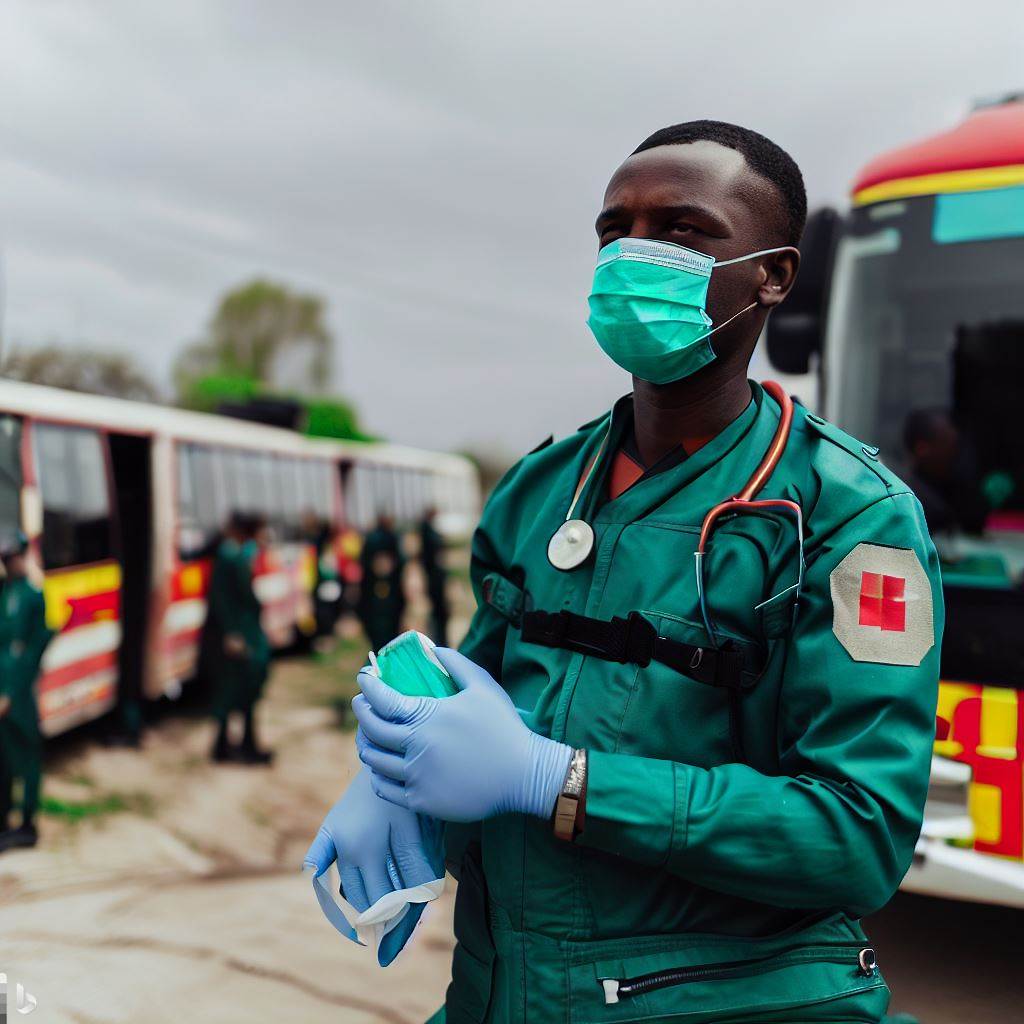Introduction
Paramedics play a crucial role in providing emergency medical services in Nigeria. The Skills Needed for a Paramedic in Nigeria are vital for saving lives and ensuring effective medical response during critical situations.
In the high-stakes world of emergency medical services (EMS), paramedics are the front line of care, providing critical aid during life-threatening situations. Their ability to think on their feet, respond swiftly, and provide optimal care can make a life-saving difference.
The importance of these skills cannot be overstated. When seconds count, paramedics must rely on a diverse set of abilities to navigate complex scenarios and deliver the best possible care.
Whether it’s responding to a car accident, a medical emergency, or any other crisis, a paramedic’s skills play a pivotal role in determining patient outcomes.
The essential skills needed for a paramedic in Nigeria include:
- Critical Thinking: Quickly assess situations and make informed decisions under pressure.
- Medical Knowledge: Understand various medical conditions and their appropriate treatments.
- Communication: Effectively convey information to patients, their families, and medical teams.
- Calm Under Pressure: Maintain composure in high-stress situations for clear-headed decision-making.
- Problem-Solving: Adapt to unforeseen challenges and devise solutions on the spot.
- Compassion: Offer empathetic and respectful care to patients and their families.
- Physical Stamina: Perform physically demanding tasks and lift patients when necessary.
- Teamwork: Collaborate seamlessly with other medical professionals for coordinated care.
In this blog chapter, we will delve into each of these essential skills, exploring their significance and impact on providing efficient and effective emergency medical services in Nigeria. By understanding the vital role these skills play, aspiring paramedics can equip themselves to meet the demands of this noble and critical profession.
Medical Knowledge and Expertise
Medical knowledge is the cornerstone of any healthcare profession, and being a paramedic in Nigeria is no exception.
Having a strong foundation in medical knowledge is crucial for paramedics, as it forms the basis for their ability to provide emergency medical care.
In order to become a paramedic in Nigeria, individuals must undergo extensive training and education. This includes completing a recognized paramedic program, which is typically offered at a college or university.
The program equips aspiring paramedics with the necessary skills and knowledge to respond to medical emergencies effectively.
Paramedics in Nigeria should possess a wide range of medical expertise to be able to provide the highest level of care.
This includes a deep understanding of human anatomy, which allows them to assess and identify various injuries or medical conditions.
Knowledge of physiology is also essential, as it helps paramedics understand how the body functions and how different systems interact with each other.
Furthermore, paramedics should be well-versed in pharmacology, which involves the study of drugs and their effects on the body.
This knowledge enables paramedics to administer medications safely and accurately during emergency situations.
In addition, a strong understanding of emergency medicine is necessary, as paramedics often encounter life-threatening situations that require immediate and appropriate interventions.
Paramedics also need to stay updated with the latest developments in the medical field. This means regularly attending training sessions, conferences, and workshops to enhance their knowledge and skills.
Continuous professional development ensures that paramedics are equipped with the most up-to-date information and can provide the best possible care to their patients.
In the end, a paramedic in Nigeria must possess a strong foundation in medical knowledge and expertise.
Their training and education should encompass various areas such as anatomy, physiology, pharmacology, and emergency medicine.
By having the necessary medical skills, paramedics are better equipped to provide timely and effective emergency medical care.
Read: Success Stories: Nigerian Medical Lab Technicians
Communication Skills
Effective communication is crucial in emergency situations as it ensures timely and accurate information exchange.
Clear and concise communication is vital for paramedics to convey instructions and gather relevant information from patients.
Paramedics must communicate effectively with patients, their families, and other healthcare professionals to provide quality care and alleviate anxiety.
Strong listening skills enable paramedics to understand patients’ needs and concerns, ensuring appropriate medical interventions.
Paramedics should be able to provide accurate information to medical teams, enabling effective collaboration and streamlined patient care.
Effective communication helps paramedics build trust and rapport with patients, fostering a positive therapeutic relationship.
Paramedics who communicate clearly and compassionately are more likely to elicit patients’ cooperation and reduce stress levels.
By communicating effectively, paramedics can manage patients’ expectations and address any misconceptions or fears they may have.
Clear communication with other healthcare professionals ensures seamless transfer of patient care and promotes coordinated interventions.
Paramedics who possess excellent communication skills can effectively educate patients and their families about their condition and treatment plans.
Read: Lab Technician Profession: Nigerian Health Sector Impact
Critical Thinking and Problem-Solving Abilities
Paramedics in Nigeria face numerous complex and unpredictable situations on a daily basis, making critical thinking and problem-solving abilities absolutely essential to their profession.
Encountering Complex and Unpredictable Situations
Paramedics are often the first responders to emergency situations, where they are confronted with a wide range of medical emergencies and accidents.
These situations can be highly unpredictable, as each patient’s condition is unique and can change rapidly.
In addition, paramedics must also address the challenges of working in diverse environments, such as crowded streets, remote areas, and even conflict zones.
These factors contribute to the complexity of their work.
The Need for Critical Thinking
Paramedics must possess excellent critical thinking skills to analyze situations, assess patient conditions, and determine the most appropriate course of action.
They must quickly gather relevant information, evaluate it accurately, and prioritize interventions based on the severity of the situation.
This involves considering multiple factors, such as the patient’s medical history, vital signs, symptoms, and the available resources at hand.
Critical thinking enables paramedics to make informed decisions under pressure.
Making Quick Decisions
Time is of the essence in the field of emergency medicine, and paramedics must make fast decisions that could potentially save lives.
They often operate in high-stress environments, where split-second decisions can have significant ramifications.
For instance, determining whether to administer certain medications, initiate life-saving procedures, or call for additional support requires swift thinking and rapid decision-making.
Competent paramedics rely on their critical thinking skills to make these quick, yet crucial, decisions.
Importance of Problem-Solving Skills
Problem-solving skills are vital for paramedics when assessing patient symptoms, diagnosing conditions, and delivering appropriate treatment.
They must be able to identify and analyze symptoms accurately to formulate a diagnosis.
This often involves piecing together various clues from patients’ complaints, physical examination findings, and diagnostic tools.
Moreover, paramedics must tailor their treatment plans to suit each patient’s unique needs effectively.
Problem-solving skills allow them to adapt to unexpected challenges and devise creative solutions in the midst of emergency situations.
Analyzing Symptoms
Paramedics need to have a keen eye for detail and strong problem-solving abilities while analyzing symptoms.
They must be able to consider all possible causes and prioritize the most likely ones, even with limited information.
This process requires the ability to think critically and logically, connecting different pieces of information to form a comprehensive assessment.
Providing Appropriate Treatment
Once paramedics have identified the underlying cause of a patient’s symptoms, they must use their problem-solving skills to select the most appropriate treatment.
This may involve considering various protocols and guidelines, weighing the risks and benefits of different interventions, and consulting with medical control or other healthcare professionals.
Their decisions should be based on sound judgment, evidence-based practices, and a thorough understanding of the patient’s condition.
Assessing Patient Conditions
Paramedics must continuously assess and reassess a patient’s condition to ensure their interventions are effective and timely.
This requires problem-solving abilities to identify any changes or complications that may arise during the course of treatment.
By using critical thinking skills, paramedics can adapt their strategies and take appropriate actions to address any unexpected developments.
In review, critical thinking and problem-solving abilities are crucial for paramedics in Nigeria.
These skills enable them to navigate through complex and unpredictable situations, make quick decisions, and provide appropriate care to patients.
By honing their critical thinking skills, paramedics can enhance their ability to assess symptoms, deliver effective treatment, and adapt to unexpected challenges, ultimately improving patient outcomes in emergency situations.
Read: Challenges Faced by Medical Lab Technicians in Nigeria
Strong Decision-Making Skills
The paramedic profession in Nigeria is demanding, requiring strong decision-making skills.
Paramedics often face high-pressure situations where quick and critical decisions are vital, directly impacting patient safety and care effectiveness.
Therefore, they must make informed and efficient choices for optimal outcomes.
Being a Nigerian paramedic demands swift, critical thinking. They must weigh treatment options’ risks and benefits and make confident, split-second decisions, as every second counts in emergencies.
Trusting their instincts and relying on training and experience is crucial, but decisions should be well-founded.
Effective decision-making involves thorough assessments, proper communication, and collaboration with other medical professionals.
Remaining calm and composed under stress is key, enabling them to prioritize actions based on patient condition and available resources.
Efficient decisions ensure providing the best care to patients and can significantly impact emergency outcomes.
Continuous training and staying updated with medical advancements and guidelines help refine their decision-making skills and prepare for unique challenges in their profession.
In fact, strong decision-making skills are paramount for Nigerian paramedics. The demanding nature of their profession and high-pressure situations necessitate effective decision-making.
Through informed and efficient choices, they ensure patient safety and deliver optimal care. Continuous development and refinement of decision-making skills are crucial for success in the paramedic profession.
Read: Importance of Ethics for Medical Lab Technicians in Nigeria

Adaptability and Resilience
Paramedics in Nigeria face a challenging and unpredictable work environment. They must be able to adapt to different situations and remain calm and composed in stressful circumstances.
The need for resilience and the ability to handle emotional and physical strain cannot be understated.
Addressing the Unpredictable Nature of Medical Emergencies
Medical emergencies can occur at any time and in any place. Paramedics must be prepared to face a wide range of situations, from car accidents to heart attacks.
The ability to adapt to these unpredictable circumstances is crucial for providing effective care.
When responding to an emergency, a paramedic must quickly assess the situation and determine the appropriate course of action.
This requires the ability to think on their feet and make split-second decisions. The ability to adapt to different scenarios and think creatively is essential in saving lives.
The Importance of Remaining Calm and Composed
Stressful circumstances often accompany medical emergencies. People may be in pain or distress, and the environment may be chaotic. In such situations, it is vital for paramedics to remain calm and composed.
A calm and composed paramedic can project a sense of reassurance to the patient and their loved ones.
This not only helps alleviate anxiety but also enables the paramedic to perform their duties more efficiently. It is crucial for a paramedic in Nigeria to maintain a level-headed approach, even in the face of adversity.
The Need for Resilience
Paramedics in Nigeria face emotionally and physically demanding situations on a regular basis.
Witnessing traumatic events, responding to life-threatening situations, and dealing with the loss of patients can take a toll on their mental and physical well-being.
Resilience is the ability to bounce back from difficult experiences and continue performing at a high level.
A resilient paramedic can maintain their effectiveness despite the emotional and physical strain they encounter on the job.
Resilience can be developed through proper training, support systems, and self-care practices. Paramedics need to prioritize their own well-being to ensure they can continue to serve their patients effectively.
Adaptability and resilience are essential skills for paramedics in Nigeria. They must be able to adapt to the unpredictable nature of medical emergencies and remain calm and composed in stressful circumstances.
The ability to handle emotional and physical strain is crucial for maintaining effectiveness and providing quality care to patients.
Aspiring paramedics should not only focus on the technical aspects of the job but also develop these crucial skills.
With the right training and support, paramedics can navigate the challenges they face and make a significant impact in saving lives in Nigeria.
Interpersonal Skills and Empathy
Establishing trust and rapport with patients is crucial for paramedics in Nigeria. When patients are vulnerable, they must feel safe and comfortable in the presence of the paramedic.
Trust allows open communication and cooperation, vital for effective treatment.
Empathy and compassion are essential traits in this profession. Often, patients are scared, in pain, or distressed. Showing empathy eases their emotional burden, creating a supportive environment.
When patients feel understood and validated, their experience improves significantly. Listening to their concerns and providing comfort makes a difference in their well-being.
Compassion extends to the patient’s family, who may also be struggling. By empathizing with them, paramedics foster trust and cooperation.
Bedside manner is critical during treatment. Being attentive, respectful, and maintaining good communication skills is key.
Patient-centered care means prioritizing individual needs and preferences.
This approach makes patients feel valued and respected. Considering their emotions, beliefs, and culture helps tailor care to their specific circumstances.
Involving patients in decision-making regarding their treatment empowers them to make informed choices, increasing trust in the paramedic’s expertise.
Effective communication skills are vital in providing patient-centered care.
Conveying information clearly ensures patients understand their condition and treatment options, reducing anxiety and enhancing satisfaction.
To summarize, interpersonal skills and empathy are crucial for Nigerian paramedics.
Building rapport and trust, showing empathy to patients and their families, maintaining an effective bedside manner, and offering patient-centered care are essential aspects of providing high-quality care.
These skills enhance patient experiences and overall care quality.
Conclusion
This blog post has highlighted the essential skills needed for a paramedic in Nigeria.
These skills include strong communication abilities, quick decision-making skills, proficiency in administering first aid, and the ability to work well under pressure.
It is important to emphasize the significance of these outlined skills as they contribute greatly to the effectiveness and efficiency of paramedics in Nigeria, ultimately leading to better patient care and increased chances of saving lives.
Paramedics play a crucial role in the healthcare system, as they are the first-line responders in emergency situations, providing immediate and critical medical care.
Their quick response and ability to stabilize patients before they reach the hospital can make a significant difference in the outcome of a medical emergency.
Therefore, it is paramount for paramedics in Nigeria to possess these essential skills to ensure the best possible outcome for patients in need of emergency medical care.




